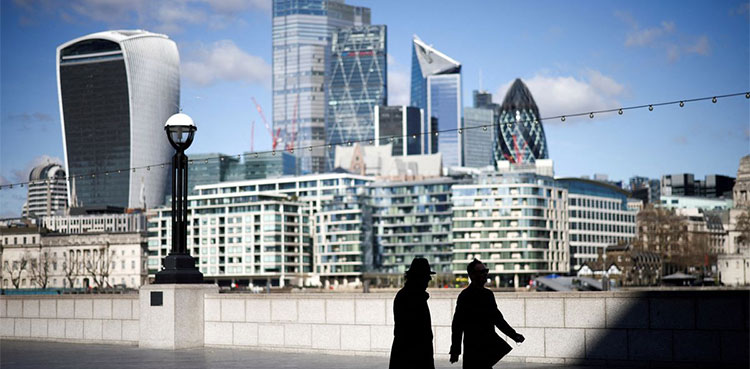
The International Monetary Fund (IMF) and ratings agency Moody’s ramped up pressure on Britain to reverse a new economic strategy that was roiling financial markets for a fourth day on Wednesday and has sparked growing alarm about the UK housing market.
The rare intervention in a G7 country from the IMF, the global lender of last resort, underscored the severity of the situation facing Britain. The value of the pound and British bonds have collapsed since Friday, when finance minister Kwasi Kwarteng laid out his plans to boost economic growth, forcing the Bank of England to signal a “significant” rate hike ahead.
In mid-morning London trading on Wednesday the pound was down 0.4% at $1.0688, 30-year government bond yields pushed past 5% to hit a 20-year high, and bond strategists warned that markets were becoming close to untradeable due to volatility.
Raymond Thomas Dalio, co-chief investment officer of the world’s largest hedge fund, Bridgewater Associates, said he could not believe the mistakes being made by new Prime Minister Liz Truss’s government.
“The panic selling you are now seeing that is leading to the plunge of UK bonds, currency, and financial assets is due to the recognition that the big supply of debt that will have to be sold by the government is much too much for the demand,” he said on Twitter.
Julian Jessop, an economist who provided informal advice to Truss during her leadership campaign, said the economy was at risk of falling into a “doom loop”. read more
The latest crisis to hit the British state was triggered by Kwarteng’s plans for deep tax cuts and deregulation to snap the economy out of a long period of stagnation, seen as a return to Thatcherite and Reaganomics doctrines of the 1980s.
With the cost of British borrowing soaring, mortgage lenders pulled hundreds of products and anecdotal reports said people were struggling to get through to lenders to either complete or change mortgage deals.
That would mark a major shock in a country where rising house prices have for years conveyed a sense of overall affluence, and where home buyers have got used to more than a decade of rock-bottom interest rates.
The IMF said the proposals, which sent the pound to an all-time low of $1.0327 on Monday, would add to a crisis of credibility after the government cut taxes and hiked borrowing just as the Bank of England lifts interest rates to tackle surging inflation.
“Given elevated inflation pressures in many countries, including the UK, we do not recommend large and untargeted fiscal packages at this juncture, as it is important that fiscal policy does not work at cross purposes to monetary policy,” an IMF spokesperson said.
Jim Reid, research strategist at Deutsche Bank, described the “rebuke” as “quite scathing”.
HUMILIATION
The IMF holds symbolic importance in British politics: its bailout in 1976 following a balance-of-payments crisis forced huge spending cuts and has long been regarded as a humiliating low point in the country’s modern economic history.
In a sign that the situation was being watched around the world, Spain’s socialist economy minister Nadia Calvino used it to attack her conservative opposition.
“We are all capable of seeing how it is leading the country not adrift, but into disaster,” she said. “An irresponsible, destructive fiscal policy.”
In a blunt release, Moody’s said large unfunded tax cuts were “credit negative” for Britain, risking structurally higher funding costs that could weaken the economy.
Stuart Rose, a business veteran who has led many of the country’s biggest retailers, said the new bout of uncertainty would force companies to halt investment.
“It won’t stimulate things today,” he told BBC Radio, adding that businesses would wait to see what happens next. “Particularly in the capital markets, when debt is going up in price and availability of debt is actually scarce.”
Kwarteng, an economic historian who was business minister for two years, has responded to the criticism by insisting that tax cuts for the wealthy alongside support for energy prices are the only way to reignite economic growth.
The IMF said his fiscal plan on Nov. 23 would provide an “early opportunity for the UK government to consider ways to provide support that is more targeted and reevaluate the tax measures, especially those that benefit high-income earners”.
Britain’s Treasury department said the November announcement would detail government plans to cut debt in the medium term.
“We are focused on growing the economy to raise living standards for everyone,” a spokesperson said.
With anxiety growing in the financial sector and among lawmakers in the governing Conservative Party, Kwarteng has spoken to bosses in the banking, insurance and financial sectors and will meet with more banking bosses on Wednesday.
On Tuesday, Bank of England Chief Economist Huw Pill said the central bank was likely to deliver a “significant” rate increase when it meets next in November, adding that financial market upheaval would have a big impact on the economy and would be factored into its next forecasts.
“It is hard not to draw the conclusion that this will require a significant monetary policy response,” Pill told the CEPR Barclays Monetary Policy Forum.
from International News Today - Breaking News, US News, World News https://ift.tt/7UCNrnu
via IFTTT